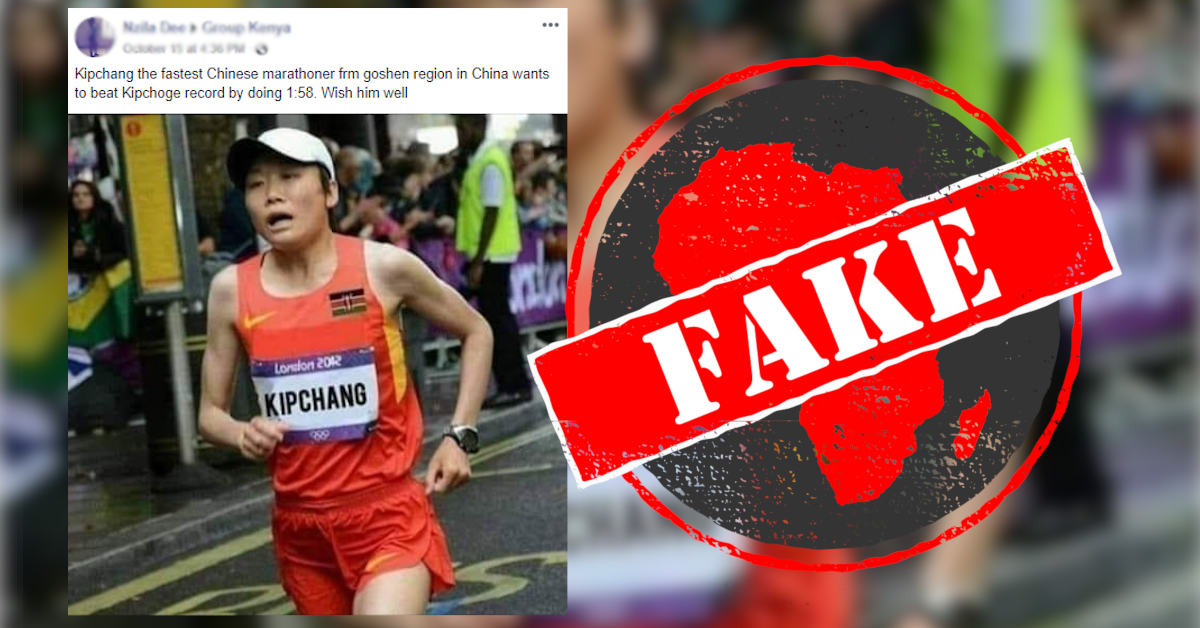Kenyan athlete Eliud Kipchoge on 12 October 2019 became the first person to run a marathon in under two hours – precisely one hour, 59 minutes and 40 seconds.
Now a post shared on a Kenyan Facebook group page claims a Chinese athlete named “Kipchang” is aiming to beat Kipchoge’s pioneering record.
It shows a photo of a runner in a red shirt with “Kipchang” on the front, the Kenyan flag near the shoulder. Above the name are the words “London 2012”, and below the five rings of the Olympic logo.
The caption reads: “Kipchang, the fastest Chinese marathoner from Goshen region in China wants to beat Eliud Kipchoge record by doing 1:58. Wish him well.”
Is this really “Kipchang”, Goshen’s fastest Chinese marathoner and Kipchoge’s challenger? We checked.

But there’s no “Goshen” region of China, as a search of Google maps and other publicly available maps maintained by the US Central Intelligence Agency and Unicef reveal. There is a city called Goshen in Indiana, US.
A reverse image search on Tineye shows that the photo first surfaced online on 17 February 2013 on Wikipedia and Wikimedia.
The photo’s file history shows it was taken on 25 August 2012 at 9:26 by an author only identified as Miho.
The photo shows Wang Jiali from China in the women's marathon at the Olympic games of 2012.
The original photo indicates that the photo of the marathoner shared on Facebook was photoshopped.
In the original, the red shirt bears the name J Wang, not Kipchang. And it carries the flag of China, not Kenya. – Grace Gichuhi
Now a post shared on a Kenyan Facebook group page claims a Chinese athlete named “Kipchang” is aiming to beat Kipchoge’s pioneering record.
It shows a photo of a runner in a red shirt with “Kipchang” on the front, the Kenyan flag near the shoulder. Above the name are the words “London 2012”, and below the five rings of the Olympic logo.
The caption reads: “Kipchang, the fastest Chinese marathoner from Goshen region in China wants to beat Eliud Kipchoge record by doing 1:58. Wish him well.”
Is this really “Kipchang”, Goshen’s fastest Chinese marathoner and Kipchoge’s challenger? We checked.

Wang Jiali, not ‘Kipchang’
But there’s no “Goshen” region of China, as a search of Google maps and other publicly available maps maintained by the US Central Intelligence Agency and Unicef reveal. There is a city called Goshen in Indiana, US.
A reverse image search on Tineye shows that the photo first surfaced online on 17 February 2013 on Wikipedia and Wikimedia.
The photo’s file history shows it was taken on 25 August 2012 at 9:26 by an author only identified as Miho.
The photo shows Wang Jiali from China in the women's marathon at the Olympic games of 2012.
Facebook photo manipulated
The original photo indicates that the photo of the marathoner shared on Facebook was photoshopped.
In the original, the red shirt bears the name J Wang, not Kipchang. And it carries the flag of China, not Kenya. – Grace Gichuhi
Republish our content for free
For publishers: what to do if your post is rated false
A fact-checker has rated your Facebook or Instagram post as “false”, “altered”, “partly false” or “missing context”. This could have serious consequences. What do you do?
Click on our guide for the steps you should follow.
Publishers guideAfrica Check teams up with Facebook
Africa Check is a partner in Meta's third-party fact-checking programme to help stop the spread of false information on social media.
The content we rate as “false” will be downgraded on Facebook and Instagram. This means fewer people will see it.
You can also help identify false information on Facebook. This guide explains how.


Add new comment